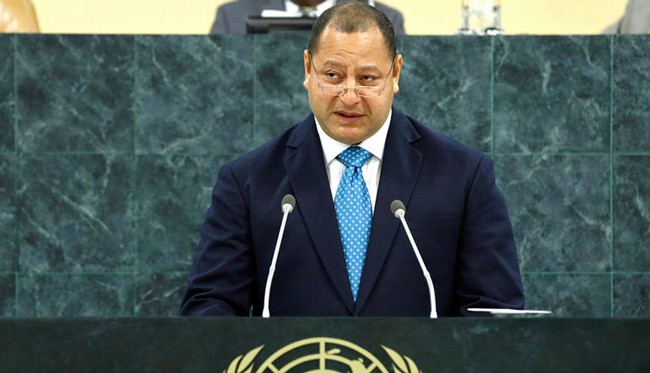
Accepting the ‘Pacific gift’
Climate change is again at the centre of international discussions, with countries raising the issue throughout the just concluded session of the UN General Assembly, and the world’s most authoritative climate science body, the IPCC, publishing its latest report. At about the same time, a family from Kiribati claimed refugee status in New Zealand.
A regional media report says that a NZ constitutional law expert doubts the viability of the proposed climate refugee plea while an immigration tribunal investigating the case has already found that the narrow UN definition of a refugee requires evidence of persecution. A long shot it may seem; the case would still be interesting to closely watch.
President Christopher Loeak of the Republic of Marshall Islands attended the 68th UN Summit to present the ‘Pacific’s gift’—outcomes of the Majuro Declaration on behalf of the Pacific Islands Forum members. The document primarily seeks shared responsibility and action from both developed and developing countries.
It is interesting to note each country’s position (or lack thereof) on climate change. Based on their statements at the General Assembly, it appears the real challenge will be whether the world’s biggest polluters accept the ‘gift’, now that the IPCC has made the connection between climate change and human activity.
Pacific nations, most of them Small Island Developing States (SIDS), are being left to paddle their own canoes when it comes to climate change. For instance, in the developed world, few spoke on the subject, let alone laid out any clear plan of action, even though the tone of the message from those Pacific leaders whose people are the most at risk, were urgent.
Palau President Tommy Remengesau stressed the ‘global warming doomsday [is] already set in stone’ if world leaders failed to act. His colleague from the Marshalls did not refer to the threat as somewhere in the future. It is ‘here’, says president Loeak.
At Majuro, Pacific leaders, (including Australia and New Zealand) demonstrated ‘climate leadership’ by committing themselves to cut emissions. All Pacific island nations took this approach knowing fully that their contribution to the global phenomenon was only a miniscule one. But the message was emphasised by President Loeak: ‘if we can do it, so can you’. Following on from that call, they appealed for ‘global statesmanship’ on climate change.
The urgency of the call was echoed, albeit with a pint of pessimism by President Tommy Remengesau of the Republic of Palau: ‘United Nations Framework Convention on Climate Change has stalled…Kyoto Protocol is on life support and Rio + 20 Conference has not done enough to strengthen our three pillars of sustainable development.’
He adds his country is ‘unwilling to even discuss a 3 degree to 5 degree temperature increase scenario by the end of the century for this will ensure our demise.’
‘We are also unwilling to discuss the issue of migration. Instead, we will continue to work with our developed partners to implement strong mitigation commitments and follow-through actions to hold the line on this increase to the more realistic 1.5 degree level.’
Few other Pacific island leaders spoke at length on the subject apart from Marshall Islands, Tuvalu, Nauru, Palau, Kiribati, Solomon Islands and Vanuatu. It was clear from the urgency of their message that they were concerned for their people’s very survival. Leaders from these countries took the opportunity because they knew the podium could not come any bigger.
President of Kiribati Anote Tong warned the world was ‘disastrously off course’ and expounded on the security challenges brought on by climate change. Having taken that podium seven times before, Mr Tong could say this because since the 2009 Copenhagen Summit, no concrete action by way of commitments have materialised.
Interestingly, Papua New Guinea, the Pacific’s well-to-do nation as far as economic wealth and landmass are concerned had very little to say. PNG seemed more prepared to raise its voice about economic issues and the subject of global security and peace. Fiji, on the other hand, was keen to show the world the country was moving in the right direction in the democratisation process.
New Zealand, the second major donor partner after Australia repeated its commitment to reduce emissions by 5% below 1990 levels by 2020. Prime minister John Key announced his country was ‘investing in the Global Research Alliance to find new ways to manage agricultural greenhouse gases.’
But the greatest majority of the developed world, Australia included, had nothing to say on the subject at the highest level. Australia’s deafening silence on climate change would seem to lend their recent position under the Majuro Declaration tokenistic at best.
It is no surprise immediately after the UN Summit, both Prime Minister Tony Abbott and his Foreign Minister Julie Bishop, who was on hand to deliver Australia’s UN address, have been invited by Marshall Islands’ Tony deBrum, and Pacific islanders living in Australia to pay a visit to countries affected to see first hand what realities islanders are up against.
From the developed world only Denmark cared to raise the issue, while Maldives, Dominican Republic, Cambodia and Botswana from the other developing nations, spoke about the significance of reducing greenhouse gas emissions.
President Loeak has warned that such international fora could easily become ‘poetic rituals’ if they are ‘allowed to cloud and bury political will needed to put words into action… (and) simply repeating well-worn negotiation slogans will get the world nowhere – it is time for new solutions.’
Perhaps there will be room for much better discussions and finding realistic solutions in 2014 once the UN Secretary General gets his Climate Change Summit under way. Pacific leaders are hopeful the summit will not turn out to be another ‘talkfest’, but one that should garner the necessary political will to increase levels of commitments to reduce green house gases.
